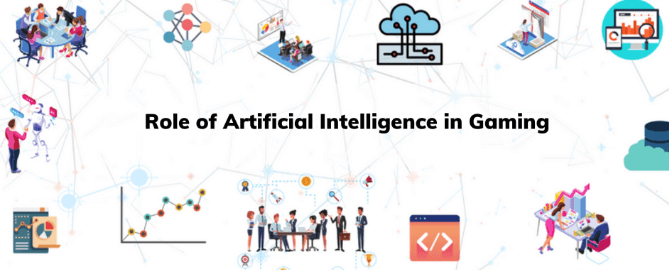Artificial Intelligence in Gaming IndustryArtificial intelligence (AI) has had a significant impact on the gaming industry in recent years, with many games now incorporating AI to enhance gameplay and make it more immersive for players. 
One common use of AI in gaming is in the control of non-player characters (NPCs). These characters can interact with players in a more realistic and dynamic way, adding to the immersion of the game. For example, NPC characters might have their own goals and motivations that they pursue, or they might react differently to different player actions. This can make the game feel more alive and believable, as players feel like they are interacting with real characters rather than just programmed entities. AI is also being used in game design to create more dynamic and interesting levels and content. This can help developers create more diverse and engaging games with less effort. For example, AI might be used to design game levels that are procedurally generated, meaning that they are created on the fly as the player progresses through the game. This can help keep the game fresh and interesting for players, as they are not simply playing through the same levels over and over again. AI can also be used to enhance gameplay itself by providing intelligent opponents for players to face off against. This can make games more challenging and rewarding for players, as they feel like they are really competing against a worthy opponent. In some cases, AI might even be used to adapt to a player's playstyle and provide a more personalized gameplay experience. In addition to these uses, AI can also be used to provide players with virtual assistants that can help them during gameplay. These assistants might use natural language processing (NLP) to understand and respond to player requests, or they might provide information or guidance to help players progress through the game. Overall, AI is helping to improve the quality and variety of games available, as well as making them more immersive and engaging for players. As AI technology continues to advance, it is likely that we will see even more innovative uses of AI in the gaming industry in the future. 
Applications of AI in Gaming IndustryThere are several ways in which artificial intelligence (AI) is being used in the gaming industry:
Overall, AI is helping to improve the quality and variety of games available, as well as making them more immersive and engaging for players. Limitations of Artificial Intelligence in Gaming IndustryThere are a few limitations to the use of artificial intelligence (AI) in the gaming industry:
Overall, while AI has the potential to greatly enhance the gaming industry, there are still limitations to its use that developers must consider.
Next TopicArtificial Intelligence in HR
|
 For Videos Join Our Youtube Channel: Join Now
For Videos Join Our Youtube Channel: Join Now
Feedback
- Send your Feedback to [email protected]
Help Others, Please Share










